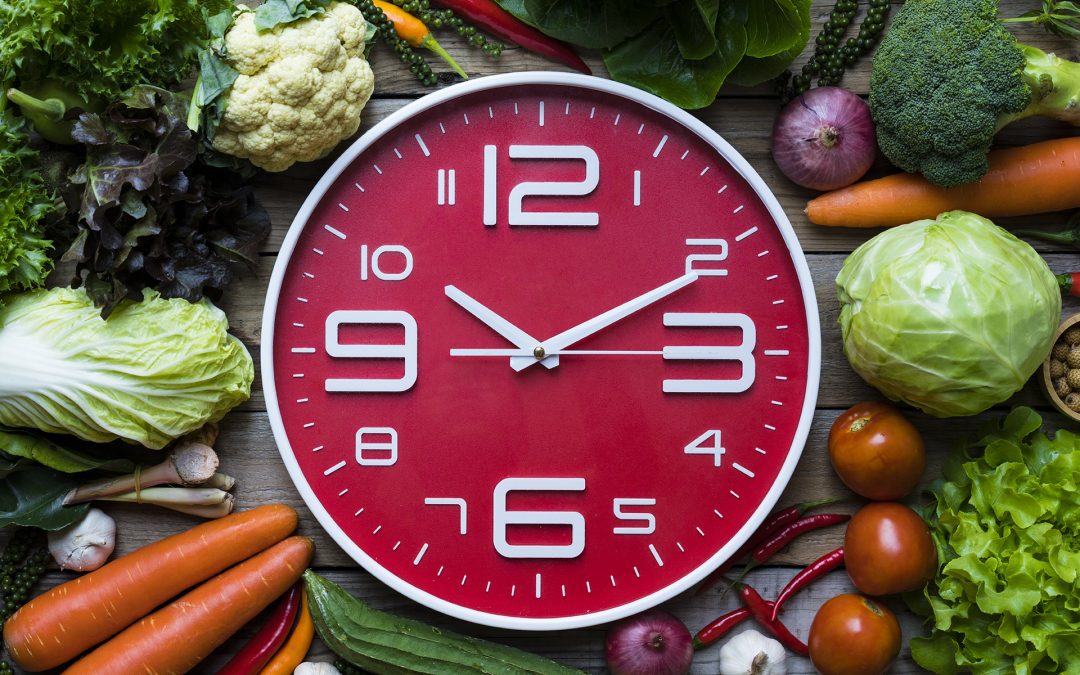What is the best eating schedule? Three meals, many meals or even fasting? Reviewing common diet patterns and what may work best for YOU.

It seems the “experts” are always changing their minds on what and when we should eat. Eat this. Don’t eat that. Stop eating that thing we told you to eat last year and eat this instead. Eat 3 meals a day. Eat 6 meals a day. Fast one day a week. Do intermittent fasting 3 times a week. Never eat after 5pm. Don’t skip breakfast. Actually it’s ok to skip breakfast. But don’t forget, breakfast is the most important meal of the day! My goodness, it’s enough to make your head spin.
A recent study (see link below) suggests eating within a 10-hour window each day may be ideal for reducing weight and metabolic disease. They don’t talk about the pattern within that window, but simply limiting the hours in which calories may be consumed. Interesting.
This adds to the piles of research and opinions around when to eat. Are you confused about the ideal eating pattern for you? Are you confused by all this talk of meal timing and intermittent fasting? If so, read on to break down some of these common suggestions. Hopefully you can come to an understanding of what sort of meal schedule will optimize your health and allow you to reach your goals, whether that’s weight loss, balanced blood sugar, improved mood, etc.

First of all, there is no ideal pattern for everyone. Let’s get that straight. The ideal eating times for you are those that work with your schedule and lifestyle. I’ve seen many eating patterns that work for people, from the regular 3 meals a day to 2 meals per day + snack, or 6 small meals, etc. The only reason to change a pattern is if it isn’t working for you or is clearly an unhealthy one (which usually you know if that’s you).
Before we even get too far, let me say up front I am not a fan of the 6 small meal per day sort of schedule. First of all it’s often quite stressful for people to be able to remember to eat as many time as they need do. Say you have a small breakfast before work but can’t take a break to eat 2 hours later because of a big meeting? Now you are starving and prone to make poor choices later in the day.
Also, blood sugar rhythms tend to follow a 3-4 hour cycle. When you eat a meal, typically, your blood sugar peaks about 1-2 hours later. Then it slowly comes down over the following couple hours and you gradually become hungry again. Now, if we are constantly fueling every two hours, our blood sugar is never given a chance to return as low as it should between meals. Granted a smaller meal is going to have a smaller blood glucose rise, but the point is that we aren’t following the natural rhythm of our glucose cycles.
Additionally, longer spaces between meals are really great for our digestion. I know I have written about this before, but we have this wonderful process in our small intestine called the migrating motor complex, or the MMC, for short. It’s role is to sweep clear the small intestine and increase motility, allowing things to move along and digest as they should. Thing is, this process only takes place about 60-90 minutes after eating, in a semi-fasted state. And it needs some time to work. If we are eating every two hours, we keep shutting this process down. For some, this sets them up for indigestion and bloating, and can even lead to microbial imbalances. Better meal spacing can help support the MMC and keep our digestion plugging along as it should.
Lastly, many of my clients who have tried the 6 mini-meal schedule are in actuality just snacking all day. Yes, it’s all small stuff, but it becomes a nonstop snack party. Many of those “snacks” are a lot higher in calories than one thinks, and instead of increasing energy and losing weight, it becomes an easy way to gain weight. Frustrating for many, to say the least.

Clearly I’m not a fan of eating multiple mini meals throughout the day. In my opinion, a 4 hour spacing (or 3 at the minimum) seems ideal. This solves many of the aforementioned issues and tends to fit well for our normal wake/sleep cycles.
What might this type of schedule look like. Certainly it can very, but let’s take an example from one of my days:
7am – Breakfast: 1 fried egg, 1 piece whole wheat toast w/ almond butter, honey, cup of black coffee
12pm – Lunch: Leftover beef and bean chili (1.5 cups) with 2 tbsp guacamole, 1 tbsp sour cream, a sprinkle of grated cheese, 1 orange, water.
3:30 – 4pm – Snack: 12 almonds, 1 banana
6:30pm – Dinner: 2oz baked chicken breast, 1 cup Puttanesca (spaghetti, sauce with anchovies, tomatoes, olives, garlic) ½ cup roasted broccoli, water.
You can see the spacing varies (and it does from day to day), but the goal is at least 3.5-4 hours between meals most of the day, with the evening meal being the least spaced given I can’t always control the exact timing of dinner (kids and hubby have a big say in that!). THIS is the schedule that works for me. You may decide to follow the same principles, but the exact execution may look different. That is a-ok.
Then the next question is, what about fasting or intermittent fasting?
Ah, great question. There is so much swirling around about restricted eating patterns to help you lose weight and even increase longevity.
Look, I have been reading this stuff too, and I won’t say that it doesn’t work. I am sure fasting has many amazing benefits. It is supposed to improve fat burning, boost the immune system, reduce the risk for cancer, raise growth hormone levels, improve brain function, and a host of other claims. It’s likely true. We see some of these in rat studies as the one previously mentioned.
There are various iterations of these fasting schedules. Some fast one day per week, others fast more than that, and others will have mini-fasts one time per week up to several times per week.
The real question with any of these is, is it realistic? Is this something you can stick with? Is this reasonable for your lifestyle and your family? If not, it’s just another fad that will leave you back at the same place you started. Think hard before you decide to go for these types of diets. Again, I’m not saying don’t do it, because the health benefits may be just what you need, but think hard about whether this is a change you want to keep for the forseeable future.
One tactic I personally employ is the same as hinted at in this article, a semi-restricted eating schedule that limits the hours of consumption. I think of it as “night” fasting. By increasing the hours without eating between evening and morning, you can achieve some of the same benefits of fasting and even help reduce weight, at least per this recent study. Also, this tends to cut out eating after dinner which for many is a huge calorie save right there. Per the article, this type of “fasting” can improve metabolism and reduce metabolic disease (reduce cholesterol, balance blood glucose, improve blood pressure, etc).
But the question is, is this realistic? I think for most it is. It’s a hard choice limit eating at certain hours (those cravings can be no joke!) but you can make that choice and stick with it, especially in the evening when work is over and most importantly, kids are in bed!
Not sure this is actually doable? Check out this schedule:
9am: breakfast
12pm: lunch
3pm: snack
6:30pm: dinner (goal of being done by 7pm)
OR:
7am: breakfast
10am: Snack
1pm: Lunch
5pm: Dinner
As you can see in both of these examples, the spacing is slightly less than the 4-hour window, however with the increase space between dinner and breakfast, you likely get many of the benefits as the article describes.
Remember my eating schedule as depicted earlier? You can clearly see that is not a 10-hour window there. I have implemented more of a 12-hour window. I have cut out any evening eating and made sure breakfast is time 12 hours after dinner. Maybe not as great as the article supports, but that’s where I am at!
Hopefully this slightly long-winded discussion gives you some points to ponder in figuring out the “right” plan for you. Whatever your health goal may be, meal spacing and limited eating hours during the day may be just what you need to start seeing the results you are looking for!
*If you have diabetes or any other condition that may require more rigid eating times, please do discuss any changes to your current diet with your medical practitioner first!
1. https://www.sciencedaily.com/releases/2018/08/180831130131.htm
